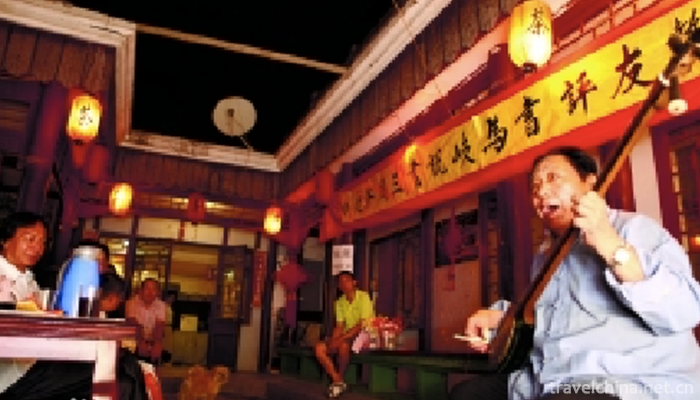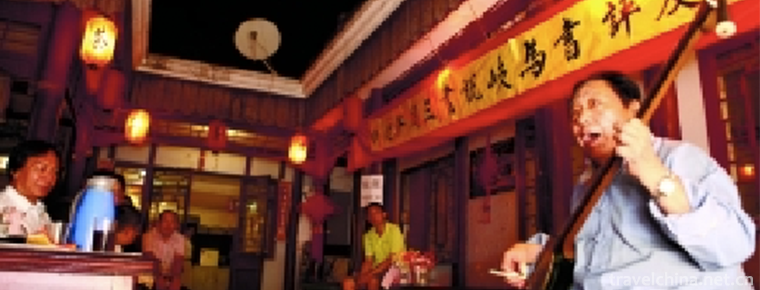Beijing storytelling
Beijing storytelling
Beijing Book Review is a traditional art of rap and singing. Legend has it that Liu Jingting (1587-1668), a Southern Jiangnan storyteller, came to Beijing in the late Ming and early Qing Dynasties. It is also said that Wang Hongxing, a Beijing drum artist in the Qing Dynasty, worshiped Liu Jingting as a teacher when he went to the south of the Yangtze River to present his art. After returning to Beijing, he changed his commentary, and in Yongzheng's thirteenth year (1735), he put on record and taught his apprenticeship in the master of ceremonies, which has been handed down to the present day.
On June 7, 2008, Beijing's evaluation was approved by the State Council to be included in the second batch of national intangible cultural heritage lists.
Historical origin
Beijing Book Review is the main body of Northern Book Review. It was formed in Beijing and prevailed in Beijing, Tianjin, Hebei and East provinces. Overview of the development process of Beijing's book reviews, it can be roughly divided into four periods: the early Qing Dynasty, Wang Hongxing, the representative, was the founder of Beijing's book reviews. During the founding period of the late Qing Dynasty and the early Republic of China, Shuanghou Ping and Pan Chengli were the representatives. During the flourishing period of the 1930s and 1940s, famous figures such as Wang Jiekui, Lian Kuo-ru, Chen Shihe and so on emerged in succession, and masterpieces were gathered. In the new period after liberation, famous figures include Yuan Kuocheng, Li Xinquan and Lian Liru.
In the early days of Beijing Book Review, a man sat behind a desk with folding fans and waking wood as props and dressed in long gowns. By the middle of the last century, it gradually became a standing speech, and the clothes were no longer fixed. The traditional performance procedure of commentary is to read a "set poem" or a short story first, and then enter the formal performance. When performing formally, it is mainly about telling stories and commenting on human affairs.
The development of Beijing's book reviewing is worrying. With the passing of the old generation of famous book reviewers, there are few successors in the world of books. At the same time, the difficulties of market model operation, the disappearance of bookstore performances, the gradual fading out of television, the only problems that need to be solved urgently are radio and electronic reviews.
Inheritor
Lian Liru, female, Manchu. The Chinese Coal Mine Literary Workers'Corps is a Book reviewer.
Famous performance artists in book reviews, state-level performers, enjoy special government allowances. In 1960, he was the only heir of Lian Pai's book reviews. For more than ten years, radio and television stations in various provinces and cities have recorded more than a dozen long reviews, such as The Romance of the Eastern Han Dynasty, The Romance of the Three Kingdoms and The Story of the Deer Ding, which have been warmly welcomed by the audience. Many times, he went to Singapore to record Liaozhai, Dream of Red Mansions, Water Margin and other books for Lihuo Radio and Radio International. He was invited to perform in the United States and Malaysia, which opened the way for China to comment on books abroad. The main works are: Water Margin, Dream of Red Mansions, Luding Ji, Chopping Mang Jian, Emperor Kangxi, Romance of the Three Kingdoms, Private Visit to Kangxi, Legend of Liu Yong, Zhisheng Dongshuo, Sui and Tang Dynasties, Romance of the Eastern Han Dynasty, etc.
Yuan Kuocheng: From Beijing. Born in Tianjin. Family background, uncle Yuan Jieting, Yuan Jieying and father Yuan Jiewu known as the "three outstanding Yuan", and Liu Lanfang, Shan Tianfang, Tian Lianyuan are known as the "four major performance artists" to be good at talking about "Five Privets and Seven Privets" and renowned at home and abroad. "There was Liu Jingting in ancient times and Yuan Kuocheng in modern times", which is well known for its family background and profound achievements.
Yuan Kuocheng advocated new book-telling, bringing the traditional calligraphy evaluation on small stage to the big stage, and making it really a popular art form. On the basis of inheriting the traditional commentary, Yuan Kuocheng has been exploring, innovating, vivid and humorous in language, vivid in character, and has the characteristics of "drifting, smart, fast and crisp". New content, new style and new language. Works: Romance of the Three Kingdoms, Zhao Zilong, Da Nao Da Ming Fu, Da Nao Shenzhou Da Da Da Da Da Da Da Da Da Da Da Da Da Da Da Da Da Da Da Da Da Da Da Da Da Da Da Da Da Da Da Da Da Da Da Da Da Da Da
Inheritance significance
It is an important feature of the art of book evaluation that "comment on the past and the present" is used to talk about the past and the present and to awaken the world. The evaluation of books should be based on "evaluation" and be focused on "evaluation". It can be said that the art of Chinese book reviewing represented by Beijing book reviewing is one of the art types with the most Chinese national characteristics and the richest Chinese aesthetic characteristics. However, due to inheritance, propaganda and other issues, Beijing's book reviews have not been carried forward, which is quite different from Beijing Opera.


-
1.Daocheng Yading County Ganzi Sichuan China
Aden Scenic Spot is located in Riwa Township, Daocheng County
Time 2018-10-12 -
2.China Railway HighSpeedCRH
China Railway High-Speed (CRH) has two meanings: the technical standard of China High-Speed refers to the passenger dedicated line railway with 250 km/h
Time 2018-11-13 -
3.Zhouzhuang Town
Zhouzhuang Ancient Town is a preferred site for world cultural heritage and the first batch of national 5A tourist attractions. It is located in the southeast of Suzhou City and at the junction of Kun
Time 2018-12-06 -
4.Mars Manor Scenic Spot
Ma's Manor, located in Xijiang Village, 20 kilometers west of Anyang City, Henan Province, is the mansion of Ma Piyao, governor of Guangdong Province in the Qing Dynasty.
Time 2019-02-06 -
5.The Story of Barragan
Stories of witty figures of the Mongolian people in China. Long-term spread in Inner Mongolia, Xinjiang and other Mongolian areas. The protagonist Balagan Cang is the representative of the working peo
Time 2019-04-02 -
6.Kite making skills
Kite making skills, Weifang City of Shandong Province, Nantong City of Jiangsu Province, Lhasa City of Tibet Autonomous Region, Beijing, Tianjin and other local traditional skills, one of the national
Time 2019-04-29 -
7.Ou sculpture
Ou sculpture, commonly known as color oil-pickle sculpture, also known as "color relief", is a unique folk art in Wenzhou, Zhejiang Province, one of the local traditional arts and crafts. It
Time 2019-06-08 -
8.Eighteen Butterflies
Eighteen butterflies is a local traditional dance form popular in the central part of Zhejiang Province (mainly in the area of Jinhua Yongkang). Twenty young women play the whole set of eighteen butte
Time 2019-06-15 -
9.Tajik Marriage Customs
On the Pamir Plateau, which is more than 4000 meters above sea level, there is a Tajik people living in China. This is a people who can sing, dance and hospitality. Their life is full of mystery, and
Time 2019-06-17 -
10.Anhui Jianzhu University
Anhui Architecture University is a multi-disciplinary university characterized by the discipline of civil engineering. It is Anhui province. Ministry of housing and urban rural development To build th
Time 2019-10-10 -
11.Mount balang
Balang mountain, also known as "colorful mountain", is located between Wolong Nature Reserve and Siguniang mountain scenic area. Balang mountain is called balangla in Tibetan language. It is 5040 meters above sea level. When you look up, you can see that the mountains are covered by mountains and meadows
Time 2020-11-07 -
12.Guangan location
Guang'an City is located in the east of Sichuan Province, with the geographical coordinates of 30 ° 01 ′ - 30 ° 52 ′ n, 105 ° 56 ′ - 107 ° 19 ′ e, 134.5 km from east to west, 93.6 km from north to south, from Linshui county to Dazhu County of Dazhou City, from
Time 2020-12-19